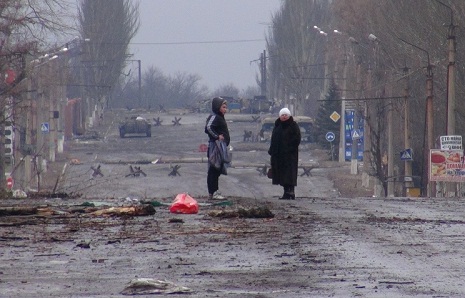Russian presidential spokesman Dmitry Peskov said on Friday after five hours of talks in the Kremlin: "Judging from proposals formulated by the French president and German chancellor, the text of a possible joint document on implementing the Minsk agreements is being in the making."
"The document is supposed to include proposals made by the Ukrainian president and initiatives formulated today [on Friday] and added by Russian President Vladimir Putin," Peskov said, adding that the text and the proposals would be submitted for approval to all parties to the Ukrainian conflict.
Agreement to assemble the leaders of Russia, Ukraine, Germany and France was reached in a four-way telephone call on Sunday. This conversation also had Putin, Poroshenko, Merkel and Hollande agree that Minsk would host another round of peace talks bringing together representatives of the contact group on the Ukraine crisis on Tuesday.
The envoys from Kiev and east Ukraine’s self-proclaimed Donetsk and Luhansk People’s Republics, alongside the Organization for Security and Cooperation in Europe (OSCE) special envoy for Ukraine, Heidi Tagliavini, and Russia’s ambassador to Ukraine, Mikhail Zurabov, discussed ceasefire for east Ukraine, a monitoring mechanism and a scheme for withdrawal of heavy weapons, a well-informed source told TASS.
Most discussions were held behind closed doors, and observers are now looking forward to Wednesday’s summit to find out more details of new peace initiatives.
Russian President Vladimir Putin on Monday said he was convinced that in order to settle the crisis in Ukraine, Kiev should urgently stop its military operation in the country’s southeast and work out such a form of constitutional arrangement that would suit all Ukrainians.
"The most important condition for the stabilisation of the situation is immediate ceasefire and ending of a so-called ‘anti-terrorist’, but in fact punitive, operation in the southeast of Ukraine," Putin said in an interview with Egyptian state newspaper Al-Ahram on the eve of his visit to Cairo.
"Kiev`s attempts to exert economic pressure on Donbas and disrupt its daily life only aggravate the situation. This is a dead-end track, fraught with a big catastrophe," he said.
"It is evident that the crisis will continue until the Ukrainians themselves agree with each other. Until the unbridled radicalism and nationalism are finished with, and the society is consolidated around positive values and genuine interests of Ukraine," the Russian president said.
"To achieve this, Kiev authorities need to listen to their people, find a common language and reach an agreement with all political forces and regions of the country. They need to elaborate such constitutional state system formula that would provide for a safe and comfortable living for all citizens with human rights being fully observed," he said.
"We hope that common sense will prevail. Russia strongly calls for a comprehensive and exclusively peaceful settlement of the Ukrainian crisis based on the Minsk agreements which were largely achieved owing to the initiative and efforts of the Russian side," Putin added.
German Chancellor Angela Merkel on Monday acknowledged in a joint news conference at the White House with US President Barack Obama that the Ukrainian ceasefire talks planned for Wednesday in Minsk were not guaranteed to work, but said "I myself actually would not be able to live with not having made this attempt."
Reacting to the announcement of the proposed four-way summit, State Department spokeswoman Jen Psaki said the United States would "remain closely engaged" as talks continued.
More about:















































